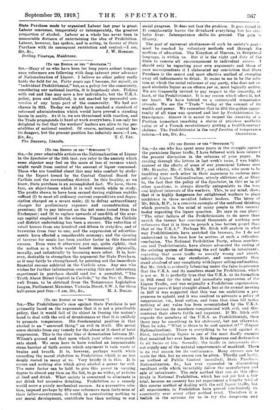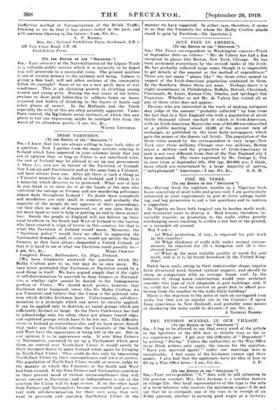[TO THE EDITOR or THE " SPECTATOR."]
Sts,—As one who has spent some years in the struggle against the pernicious liquor traffic, I have followed with keen interest the present discussion in the columns of your paper. In reading through the letters in last week's issue, I was highly amused at the efforts of some of our prominent Labour men (Mr. Braurloy, Mr. C. Slick, M.P., and others), who seem to be tumbling over each other in their eagerness to endorse your policy of Liquor Nationalization, utterly oblivious of, or blind to, the fact that the policy of the Spectator, in this as in all other questions, is always directly antagonistic to the true and highest interests of the workers. This, to my mind, show that it is highly dangerous for enlightened workers to place confidence in these so-called Labour leaders. The letter of Mr. Sitch, M.P., is a concrete example of the confused thinking which prevails in the mind of many people in this country to-day regarding the liquor question. He says in one place : "The utter failure of the Prohibitionists to do more than enrich the brewer has convinced thousands of working men reformers that it is time to preach a less barren gospel than that of the ILK.A." Perhaps Mr. Sitch will explain in what way Prohibitionists have enriched the brewers, for I do not understand in the least how he arrives at such a ridiculout conclusion. The National Prohibition Party, whose membert are real Prohibitionists, have always advocated the ending of
the existing system of licensing the evil traffic in intoxicants, regarding that same traffic as morally wrong and utterly indefensible from any standpoint, and consequently they stand absolved of any complicity withliquor selling and making. But Mr. Sitch is evidently labouring under the false impression that the U.K.A. and its members stand for Prohibition, which is not so. It is perfectly true that the U.K.A. at its formation in 1853 stood for the total and immediate suppression of the Liquor Traffic, and was originally a Prohibition organization. For four years it kept straight ahead; but at its annual meeting in 1857 it was suggested that this was too ambitious a pro- gramme to uphold, and it was resolved to advocate a policy of compromise, viz., local option, and from that time till to-day nothing of any value has been accomplished by the TJ.K.A. simply because its members compromised with evil, and thin rendered their efforts futile and impotent. If Mr. Sitch still regards the members of the U.K.A. as Prohibitionists, then there may be something in his statement, but not otherwise. Then he asks, " What is there to be said against it?" (Liquor Nationalization). There is everything to be said against it. First, intoxicating liquor is one of the most deadly enemies that mankind has ever known. It is dangerous and destructive to all forms of life. Secondly. the traffic in intoxicants does not supply any of the natural requirements of mankind. There is no real reason for its continuance. Many excuses can be made for this, but no reason can be given. Thirdly and lastly, no method of Public Control (so-called), State Purcha-e, Nationalization, &c., has ever succeeded in diminishing resultant evils which invariably follow the manufacture and sale of intoxicants. The only method that can do this effec- tively is National Prohibition, which has not yet had a fair trial, because no country has yet experienced a lengthy trial of this master method of dealing with the evil liquor traffic, but all experiments in Prohibition have proved conclusively its superiority over every other method tried. Therefore it is foolish in the extreme for us to try the dangerous and
ineffective method of Nationalization of the Drink Traffic. knowing as we do that it has always failed in the past, and trill continue likewise in the future.—I am, Sir; &c;,
A. T. R OGERS,
Prohibition Press.







































 Previous page
Previous page